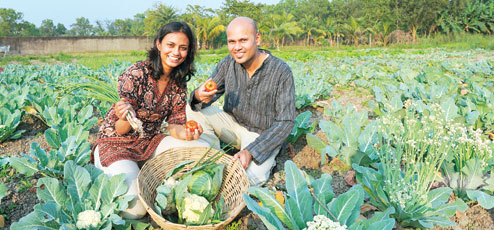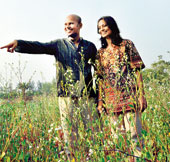Kentucky, 2005: Aparajita Sengupta, a 25-year-old English literature student doing her PhD in Indian cinema, and Debal Mazumder, a 31-year-old senior software developer, rush out of their Kentucky home with a cup of cereal each in their hands, she to her university and he to his software firm. Weekends are a blur, driving around town, visiting malls and meeting friends over drinks at a pub.
Calcutta, 2013: Aparajita and Debal are eight years older and in a different time zone, living a very different life. They have ditched their formal shoes to slip into work chappals. Instead of shopping and pubbing on weekends, they shovel manure and harvest crops. Meals are no longer about takeaways but growing food using organic and biodynamic methods. In their farm, called Smell of the Earth, said to be the first of its kind in the country!
“I am a full-time farmer now!” exclaims Aparajita, 33, her broad smile and sickle in perfect sync.
She is standing in an 11-bigha community-supported agriculture (CSA) farm in Thakurpukur on the southern fringes of Calcutta. “I join in the digging and harvesting but not the tilling because that requires a bullock and a plough, which I still don’t know how to handle,” she says, almost apologetically.
This rare mati-manush tale, with roots in Kentucky and shoots in Calcutta, began with Aparajita and Debal starting their life together in the US like any other young immigrant couple vying for their own small piece of the so-called American dream. Then something happened. Not professional instability, illness or a family crisis. Just a simple realisation that the food they were eating was “poison”.
“We were drawn to food-related issues in the US and the growing influence of GMO (genetically modified organisms) back home. It scared us that the rate of disease, birth defects, cancer and allergies related to food production was so high,” says Debal, 39, who continues to work as a software developer for his American employer while pursuing his other dream.
We had witnessed the beginning of farmers’ markets and CSA in the US, a movement that has gained unprecedented momentum in the last eight years. But India was going in the reverse direction and we felt the need to come back and do our bit in spreading awareness, starting with Calcutta’s urban population.”
And so, in the summer of 2011, the couple left their adopted American way of life to return to the chaos of Calcutta. “When we left Kentucky, we weren’t sure we would be able to start immediately because we knew we wouldn’t be able to afford land sufficient for farming in Calcutta. Our first aim was to raise consciousness among middle-class families by writing articles or filming documentaries,” says Debal.
An opportunity came knocking when a friend offered a family-owned plot in Thakurpukur, which they happily “borrowed” through a land-share agreement. In a matter of months, Debal and Aparajita’s Smell of the Earth farm had found 26 members, including software and advertising professionals, college professors, an accountant, a banker and a photographer. They pay Rs 2,000 each for organic vegetables every month.
The farm, over an hour’s drive from the couple’s Santoshpur home, is not your usual faux rural setting meant for weekend outings. It is a plot of land meant for agriculture and Debal and Aparajita intend to keep it that way.
Smell of the Earth had its first harvest in January with fresh leafy greens, radish, peas and cauliflower. Coming up are cabbage, coriander, French beans, tomato, pumpkin, brinjal, bitter gourd, potato, onion and chillies.
“Ours is a low-tech, low-energy and low-input poly and multi-cropping farm. We do inter-cropping instead of using pesticides to avoid disturbing the biodynamics. We use pond water and not ground water, and plan to make a transition to solar power,” says Aparajita.
She and Debal are quick to dispel the notion that they are in it for the money. “We don’t want to grow as a farm or expand as a business. What we would like to see grow is the idea. We want more people to look at our model and replicate it so that there can be a large network of such communities. If 30 more families were doing what we are doing, we could move towards a sustainable environment of healthy people,” Debal says.
What makes the couple happy is the enthusiasm of friends, colleagues and neighbours about their initiative. “When they came and saw the farm and attended meetings, they realised that this wasn’t just about paying Rs 2,000 for organic vegetables every month but about participation, building a community and protecting the ecosystem. The vegetables come as a bonus, as one of our members puts it,” says Aparajita.
The CSA model had started in Germany in the 1960s and was adopted by Japan before it made inroads into North America two decades later. But it was only in the new millennium that the movement gained momentum in the face of environmental awareness and food scandals in the US. Today, there are more than 7,000 CSA farms in the US and around 2,000 in Central and Eastern Europe, but just about a hundred in Asia.
A typical CSA farm comprises a community of individuals who pledge their support to an urban farm operation where the growers and consumers share the risks and benefits of food production using organic and biodynamic methods. In exchange for a monthly membership fee and a little labour during harvest, members receive shares from the farm’s bounty throughout the growing season, delivered every week.
At the Thakurpukur farm, Wednesdays and Fridays are reserved for delivery, when Aparajita fills organic cotton bags with the harvested veggies and ferries them across the city to members’ homes.
All other days, too, Aparajita is busy at the farm, having given up a post-grad teaching stint. She helps with the work and planning for the season with Manoranjan, a local farmer who has been appointed caretaker. Debal joins in on Sundays with the couple’s three-year-old daughter Kulfi.
Once a month, the members go on farm visits and assemble at the farmer couple’s Santoshpur home to watch documentaries and share books. “We keep updating our Facebook page [Smell of the Earth] with pictures of the farm and share tips and recipes on vegetables growing for the season,” says Debal.
“We recently had a wonderful experience: a two-week permaculture course [the development of agricultural ecosystems intended to be sustainable and self-sufficient] in a small village near Darjeeling. It’s still a learning process because what did we know about farming?” adds Aparajita.
Back in 2000, Jadavpur University alumnus Debal couldn’t see beyond the career that awaited him in Kentucky as a software developer, while ex-Presidencian Aparajita left Calcutta four years later to do her PhD at the University of Kentucky. It was in the US that they met, fell in love and got married.
“When we had left India we were looking at diverse opportunities of building our careers and starting a new life. We were quite unclear if we would ever come back. We bought a house, a car, had our daughter there, but once this issue started affecting us, we were convinced that we wanted to come back,” recalls Aparajita.
“We had never really been conscious about what we were eating until we started getting bothered by the taste of vegetables, the idea of processed food and TV dinners that simply go into your microwave. Onions were the size of papaya,” says Aparajita. “And chicken tasted like soap,” quips Debal.
A chance meeting with an Indian couple growing organic food helped them understand the difference between what they were eating and how nature meant food to be. “We borrowed some of their books, watched movies and visited websites they recommended. We started buying our grocery from organic food chains even though it cost us three times as much before exploring food co-operatives and farmer’s markets,” says Aparajita.
Joining a CSA farm at Lexington in Kentucky — set up by Erik Walles, “an American scientist who gave it all up to start farming” — sealed the dream Aparajita and Debal are now chasing.
WHO ARE THEY?
Aparajita Sengupta, 33, and Debal Mazumder, 39. They gave up their life in Kentucky to come back to Calcutta in 2011 and start a community-supported agriculture (CSA) farm in Thakurpukur, called Smell of the Earth.
WHAT IS A CSA FARM?
A farm comprising a community of individuals who pledge their support to an urban farm operation where food is produced using organic and biodynamic methods.
WHAT ABOUT SMELL OF THE EARTH?
Aparajita and Debal’s farm has 26 members who pay Rs 2,000 each for organic vegetables every month and participate in the movement. Its first harvest in January comprised fresh leafy greens, radish, peas and cauliflower. Coming up are cabbage, coriander, French beans, tomato, pumpkin, brinjal, bitter gourd, potato, onion and chillies.
source: http://www.telegraphindia.com / The Telegraph, Calcutta / Front Page> Calcutta> Story / by Mohua Das / Saturday – March 02nd, 2013

